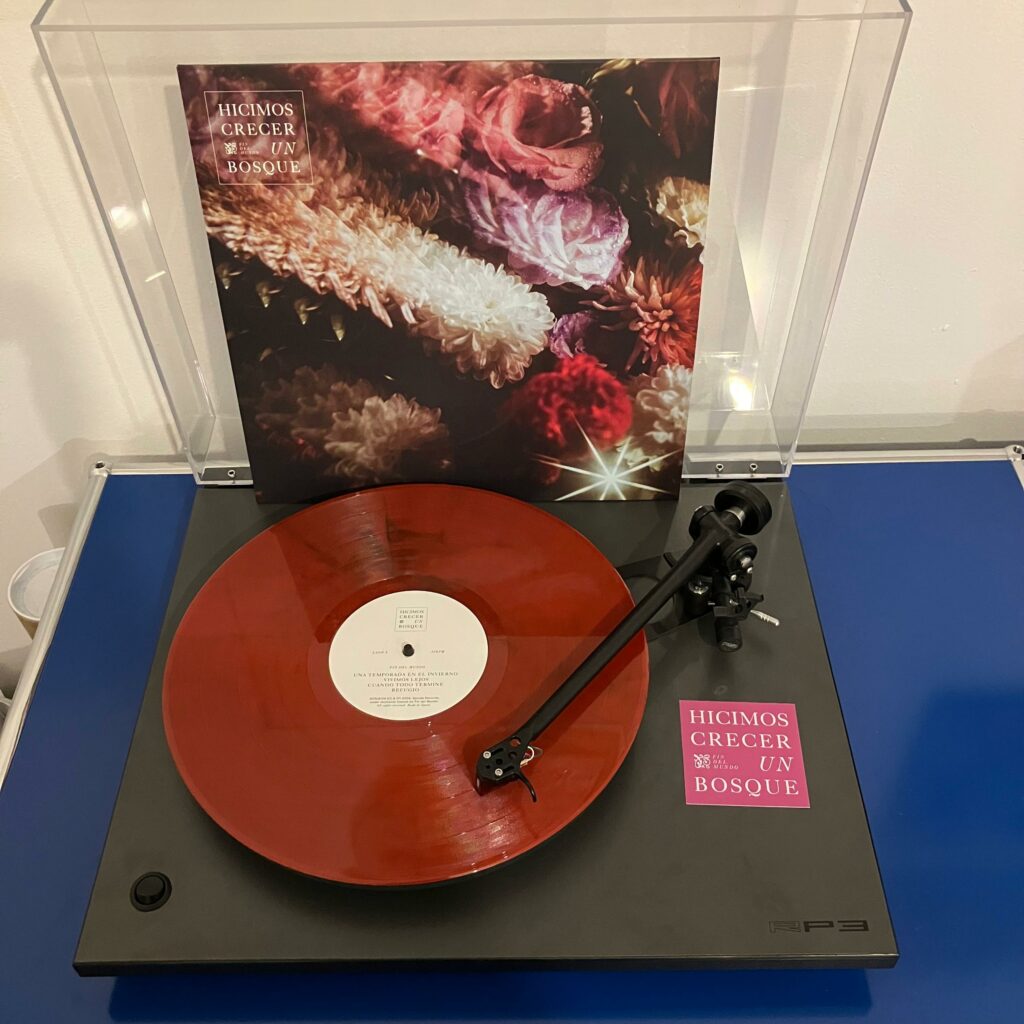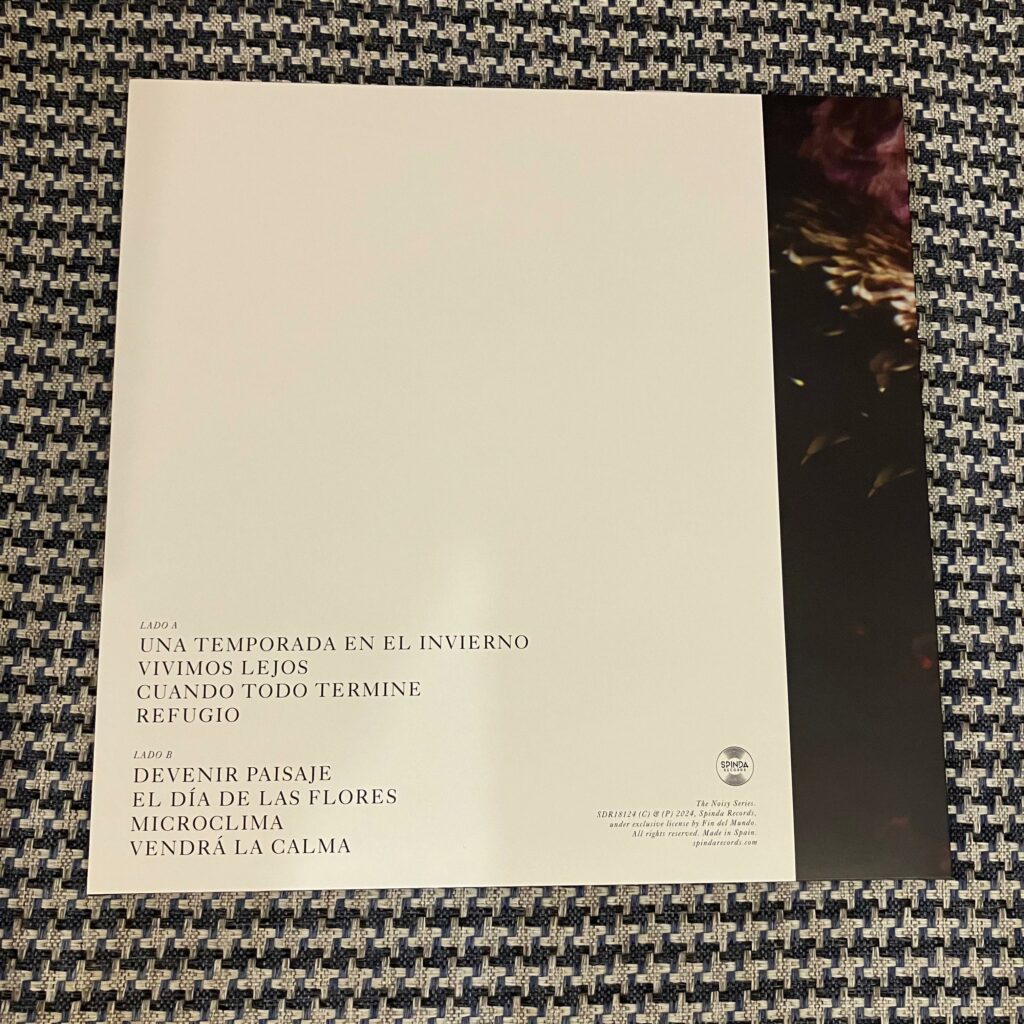Hicimos crecer un bosque (Album 2024)
Fin del Mundo
Cinematic rock Post-rock Shoegaze
The name per se, Fin del Mundo (End of the World) could inspire something majestic, catastrophic, or even prophetic. However it refers to the origin of the band, Julieta “Hache” Heredia (guitar) and Lucía Masnatta (Guitar/Voice) come from Chubut, Patagonia, Argentina. Hache is particularly from “Tierra del Fuego”, which by itself its name is very poetic, nevertheless, all this mysticism is not in vain. Together with Julieta “Tita” Limia (drums) and Yanina “Yan” Silva (bass), both from Moron, Buenos Aires, Argentina, Fin del Mundo build together a visual space of The End of The World. Still one wants to see it though, either the end of everything, physically a point where one cannot see more but emptiness, perhaps more introspectively, oneself abyss of introspection, or simply, face the vastness of the most southern landmark on the globe beside the South Pole.
On October 18th, Fin del Mundo released their second album “Hicimos Crecer un Bosque” (We Made a Forest Grew) with the label Spinda Records. When trying to define a Fin del Mundo (“Lasfinde“, from now on) a lot of people agree on post-rock & shoegaze, you can hear now and then some influences of Midwest emo, dream pop, etc., and that same ambiguity is what I think is their most valuable asset musically speaking, a blend of a handful of genres and styles in one that makes tough, if not impossible, to encapsulate them in one. Overall, what makes Lasfinde so relevant is not only their blend of genres but also their full women’s lineup, which is a statement of a revolutionary quest on its own. Their relevance relies on their capability to build their audience a full picture, scene, or even film with its own introduction, development, and conclusion. A cinematic perspective of listening to an album. Cinematic rock, I would say.
To proceed with the review, “Hicimos Crecer un Bosque” felt personal. So, the moment I thought I was being overly subjective, even though this is just a personal review, I asked some friends about their interpretations of specific songs that made me think of them or even the full album as it is. With that input and my perception, I built a whole interpretation and authentic review. So, recalling the idea of cinematic-rock, I wrote the following review as a short film composed of 8 chapters that guide the main character, into an emotional journey of self-discovery through pain, grief, and self-appreciation.
Chapter 1. “Una temporada en el Invierno” (A season in the winter)
Imagine our main character, from now on “us”, facing the intrusive thoughts of a long-lost relationship. Sometimes those thoughts get too much space, space built by the guitars of the song. -Tal vez subirán recuerdos difíciles. Por seguirte hoy me pierdo, se obscurecen mis deseos.-. And then, we recover some of that space by the change of tempo; we feel empowered and acknowledge that these thoughts will come back. However, as intrusive as they were at the beginning, it’s on us to define how far they can go, we get to know ourselves -solo así, solo acá, sé quien soy en realidad.-. The inner peace and boundary are defined by oneself. Once that boundary is drawn, we can recover the calm and pace. We start our journey, better known as process, to survive this.
Chapter 2. “Vivimos Lejos” (We live far apart)
The scene displayed musically and lyrically by Lasfinde is clear when listening to this song. Picture that moment in life when everything arranges itself and suddenly you’re not only missing one but several important relationships in your life. The song displays a scene where we and/or our loved ones go away looking for themselves, -Buscando su lugar bajo la tormenta-, we don’t want to drag them back, -no quiero arrastrate más a mi marea-, but they know, we miss them, we miss each other.
The dreamy guitars draw us floating in a small boat crossing a big ocean, a calm swell and winds. However, after a bit, in the middle of that ocean, we realize the emptiness of the sea, calmness becomes solitude. Suddenly, a thunderous rumble, all instruments join forces to change the tide to be wild and dynamic. That same dynamism drives us to the shore in an outburst, shaken but safely. Once on land, the energy of the breaking waves embraces us and makes us realize we’re not alone.
Chapter 3. “Cuando Todo Termine” (When Everything is Over)
With hints of math rock with the tipping guitars and perfectly backing drums. We are sitting in front of a new frontier, what seems to be a new “Fin del Mundo”, desertic, mainly unexplored. After waiting for so long and facing so much stuff together, we learned something, let’s get our stuff and embark ourselves into this deed, -Después de tanto esperar por fin aprendimos algo, junta tus cosas y vámonos, lejos de este ruido absurdo.-. The new adventure commences with the hopes of getting everything easier, a better life, to grasp and get a better view of life, hoping we do not get scared by what is coming, -Y al volver, con el bosque adentro, todo sera más fácil ahora, todo se ve más fácil, todo se ve más.-. The ending of the song envisions us with a potential threat, that might be revealed in the next chapters.
Chapter 4. “Refugio” (Shelter)
As instrumental as it is, it says a lot in itself, following the story we’ve been projecting, we are facing the End of the world ahead of us, seemingly by ourselves, the key is that we are not, whichever the instrument we put ourselves on, eventually, we find people that joins us until a safe net is built, a complex system of interlinked connections that turns into a shelter for us. A protection aura that helps us in this staring contest between you and the abyss.
Chapter 5. “Devenir paisaje” (A Landscape Happens)
The intro sets the pace and mood of that same landscape happening. We remember a cold and cloudy winter, a moment when we needed support however we couldn’t find it, -Si lo viví, no lo recuerdo, no te encontré en el invierno.-. At that time we felt like we weren’t appreciated, nor what we could offer to give, so we retired peacefully and dignified, -Pareciera que no necesitas lo que tengo para dar, y no quisiera ser un peso para vos.-. However, in hope for the best of all, we put ourselves out, we know we love them and we are always for them, -Siempre estoy acá.-.
Chapter 6. “El día de las flores” (The Day of the Flowers)
feat. Guillermo Mármol – Eterna Inocencia
Trapped in the past landscape, a remembrance loop that gets us into a desolation state, the conformation of loneliness. The melancholy is driven by the memory of a past life far gone. How nice it is to arrive home after crying, wandering around emotionally and mentally. -Qué bueno es llegar a mi casa. Después de llorar en la plaza. Lágrimas de mar, las cultivo en silencio.-.
Time has passed such that seasons have framed themselves with feelings and give us remembrances, -El otoño , hace que quiera volver a verte-. We are looking for a reason to be ok, while the days pass by, but the memory is blurring our thoughts -Busco razones para estar bien, los días siguen lentamente, y a veces lo entiendo, me nublan los recuerdos.-.
In the same isolation one can consider oneself as just a point in the scene, a mere cameo in this movie called Life, would you really like to see a secondary actor again? Would you even notice?
-Fria y desierta ciudad, no estoy para nadie si nadie vendrá, no soy mas que un punto en el paisaje, ¿de verdad querrías volver a verme?.-.
The intensity of Guillermo‘s voice brings the emotion to the top. We put ourselves in this flashback scene, where we are having coffee in the mornings, looking at the plants we were growing together, we feel the love and yet eternal melancholy of the fulfillment of the moment, -Ayer recordé nuestras mañanas, el jardín que hicimos crecer, y lo siento en el viento, tu abrazo eterno.-.
Chapter 7. “Microclima” (Microclimate)
The guitars build a special atmosphere, like a trip to space. We then remember space is a vacuum, no air, no matter, nothing, a mere void. A void between us and our window, waiting by ourselves and the frame that life brings to us each day. There is nothing else but us and the step ahead of us waiting to be taken, -Esperar, mirando sola por la ventana, no hay mas, evito respirar en el agua, esperar mirando sola por la ventana, no hay mas.-. We know where we are, and what is needed to survive, to exist and go on. It’s on us to follow it.
Chapter 8. “Vendrá la Calma” (Calm will come)
To conclude this short/movie, when we are immersed in the desolation, the lack of time, and desperation to look back and search for our missed ones, we get a feeling, a fresh and new idea that might change this overwhelming feeling we’ve been going through all this time, all this album, -Ya no queda tiempo para resolver, quiero ir a buscarte, no se si esta bien, tuve hoy un presentimiento, y busque algo distinto, tuve hoy un presentimiento, y busque algo distinto.-. Could it be that something better will happen to us? Yes, to us. We are not alone, the hopeful feeling of not being alone in this world, the voices of Lasfinde all together bring us this feeling, -¿Será que algo mejor nos a a pasar?-, Yes, it will, overall a cumbersome trip, but something good will come.
~~~~~~~~
With hints of different genres and several influences going through Explosions in the Sky, Godspeed You! Black Emperor, Austin TV, and Viva Belgrado, among others. Fin del Mundo creates their own style and brings us what I like to call Cinematic rock, a full display of different sceneries and passages, evoking emotions from the whole spectrum to enrich the film playing in the minds of their listeners.
After the highly acclaimed presentation Live on KEXP sessions and their first album “Todo Va Hacia el Mar“, a compilation of their first two EPs. Lasfinde outdid themselves with this new elegy of redemption and overcoming fears and challenges. A friendly reminder that we are not alone and that after all, good things will happen in the end.


~~~~~~~~
Shoutout to Roberta, Marifer, Emma, José, Sebas, and Carmen. For the outtakes and comments on the album.

The perfect example of when an album transcends to become something more, something that touches the heart, something that fills you with emotions with just one play.
Could it be that the forest represents all those relationships builds throughout life? It’d be so cool to ask las finde…
I can’t wait to hear them live again! Arriba la música latinoamericana!
Might this (and the other reviews like this one) turn into a safe space for those whom seeking for musical advice, finds its way into amazing briefs and recommendations.
Many thnks!